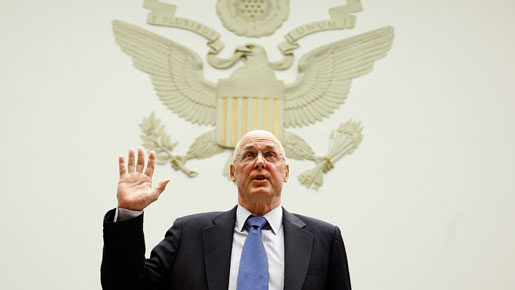
On the Brink
Henry M. Paulson Jr
Business Plus
£18.99
When Hank Paulson, the former CEO of Goldman Sachs, became America’s Secretary of the Treasury in 2006, he knew his move from Wall Street to Washington would be daunting and challenging. But he had no idea that a year later, he would find himself at the centre of the world’s most cataclysmic financial crisis since the Great Depression.
This is the personal account of the man in the very middle of the economic storm; a fast-paced retelling of the key decisions that had to be made with lightning speed. As events no one had thought possible converged and contorted into a chaotic economic nightmare, Paulson thrusts the reader into the room with the most dizzying view of the world’s downward financial spiral. More than an account about numbers and credit risks gone bad, this is an extraordinary story about people and politics, struggling under the intense strain of global financial armageddon.
Linchpins
Seth Godin
Piatku
£11.99
Seth Godin isn’t afraid of innovating or causing controversy. His previous bestselling titles (Purple Cow and All Marketers are Liars) have asserted that in the modern, informed-consumer age, the only way for business to succeed is to do something phenomenal, counter-intuitive and worth talking about – and then talk about it incessantly. His latest release brings this philosophy from the corporate to the personal. While some people are easily outsourced or freelanced into obscurity, others have their pick of opportunities. Godin argues that it’s more essential than ever to become indispensable – to become a linchpin. Linchpins are the essential building blocks of great organisations: they invent, lead, cause, connect and create order out of chaos. Godin is a clear, concise and persuasive writer, and one of today’s most influential business thinkers. For anyone who feels trapped in a labyrinth of tradition, this book is compass, map and sledgehammer.
The World Is Curved
David M. Smick
Marshall Cavendish
£9.99
Why did a relatively minor problem in the US subprime mortgage market nearly collapse the entire global financial system? Financial insider David Smick argues that the credit crunch exposed a thicket of hidden problems that is now threatening the entire global economy. Global financial markets have become a giant cauldron of uncertainty. Central bankers are losing power; China is out of control; pensions and money market funds are at risk; and worldwide class warfare and protectionism are rising. Today’s rising financial system is a house of cards – a lot closer to collapsing than most people realise. Picking up from where Thomas L. Friedman’s The World is Flat left off, Smick focuses on the globalisation of finance and how today’s risky and bumpy environment came about. He provides an insider’s perspective on the financial crisis and the potential nightmare scenarios of the future. The subprime crisis was just the beginning.
Basic Instincts: Human Nature And The New Economies
Pete Lunn
Marshall Cavendish
£11.99
Human instincts are surprisingly sophisticated and subtle, having adapted over generations of trading with each other. Understanding how these instincts work can not only change the way you think about your own affairs, it can alter how you think about a whole range of economic and business issues. A new breed of economists known as behavioural economists have started to observe economic life more closely. This book reveals the fascinating results of their studies. Human instincts have long been ignored by traditional economics, but they are crucial factors in major economic decisions, and hence important for our futures. This engaging book is about those human instincts and how the study of them has begun to change fundamentally the science of economics and our own behaviour in today’s world. An economist and former BBC journalist, Pete Lunn now works for the Economic and Social Research Institute (ESRI) in Dublin.
The New Rules of Marketing & PR
David Meerman Scott
John Wiley & Sons
£7.99
In the new media jungle understanding the “old rules” is vital to understanding the growing relevance of new marketing. Already apparent in newspapers and magazines where advertisers have struggled, radio where podcasts and spotify has decreased ad circulation and direct mail, which has been digitally replaced by spam. The fall of traditional mass media marketing means new opportunities for legions of smaller companies and independent professionals. The way Scott sees it, this is also good news for consumers: the online culture of integrity and information tends to produce quality content for less, as opposed to the vapid, one–sided and pricey advertising of print media and television. Scott provides the technical novice a thoughtful and accessible guide to cutting–edge media arenas and formats such as RSS, podcasts and viral marketing, without neglecting the fact that technological wizardry can’t substitute for a well–thought out marketing program.
The Intelligent Investor
Benjamin Graham
HarperCollins
£6.99
“The Intelligent Investor” has taught and inspired hundreds of thousands of people worldwide. Since its original publication in 1949, Benjamin Graham’s book has remained the most respected guide to investing, due to his timeless philosophy of “value investing”, which helps protect investors against the areas of possible substantial error and teaches them to develop long-term strategies with which they will be comfortable down the road.
Over the years, market developments have borne out the wisdom of Graham’s basic policies, and in today’s volatile market, “The Intelligent Investor” is the most important book you will ever read. Featuring new chapter updates – which append every chapter of Graham’s book, leaving his original text untouched – from noted financial journalist Jason Zweig, this HarperBusiness Essentials edition of the timeless classic offers readers an even clearer understanding of Graham’s wisdom.

